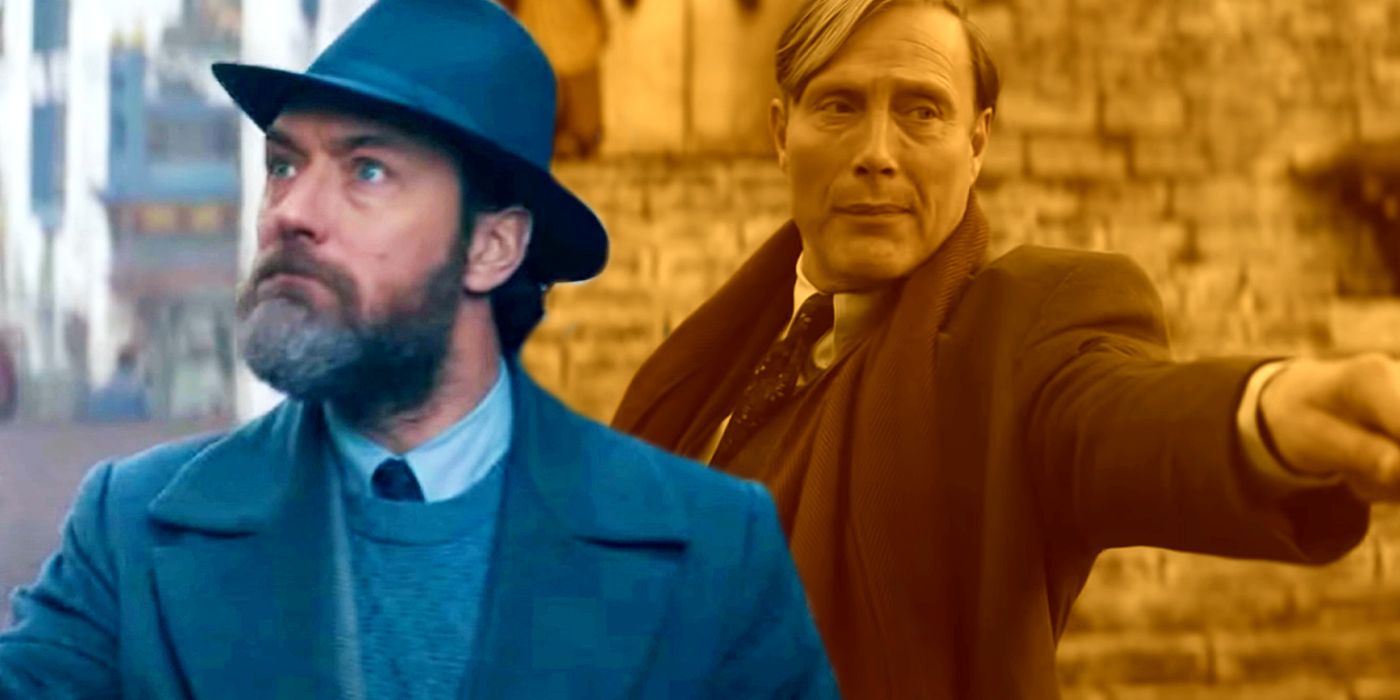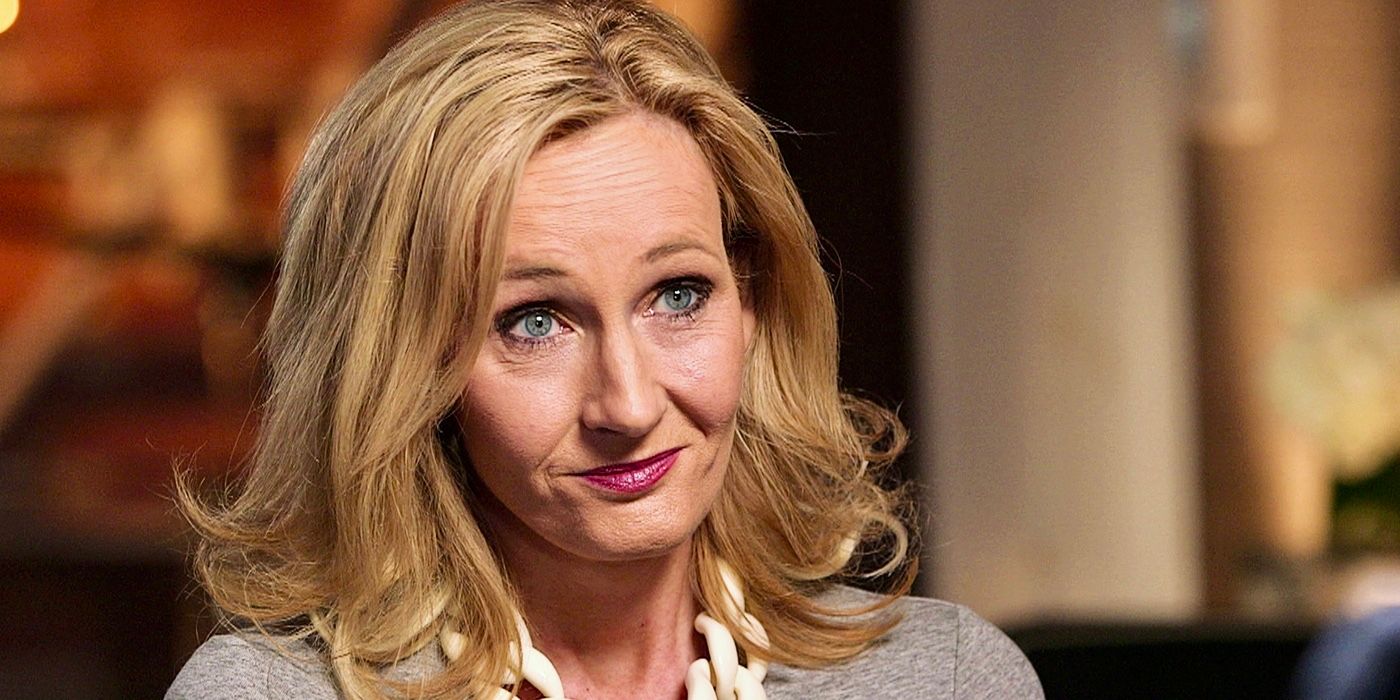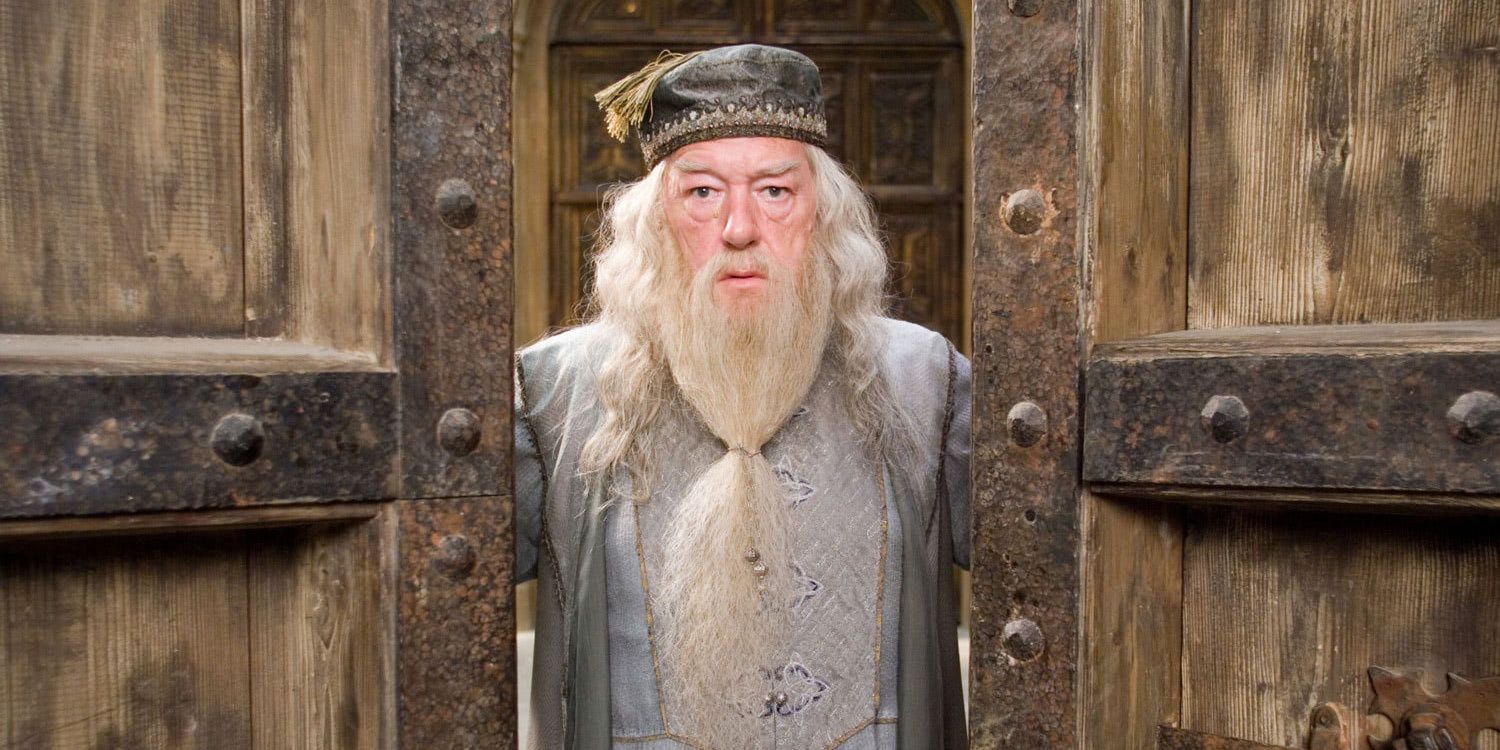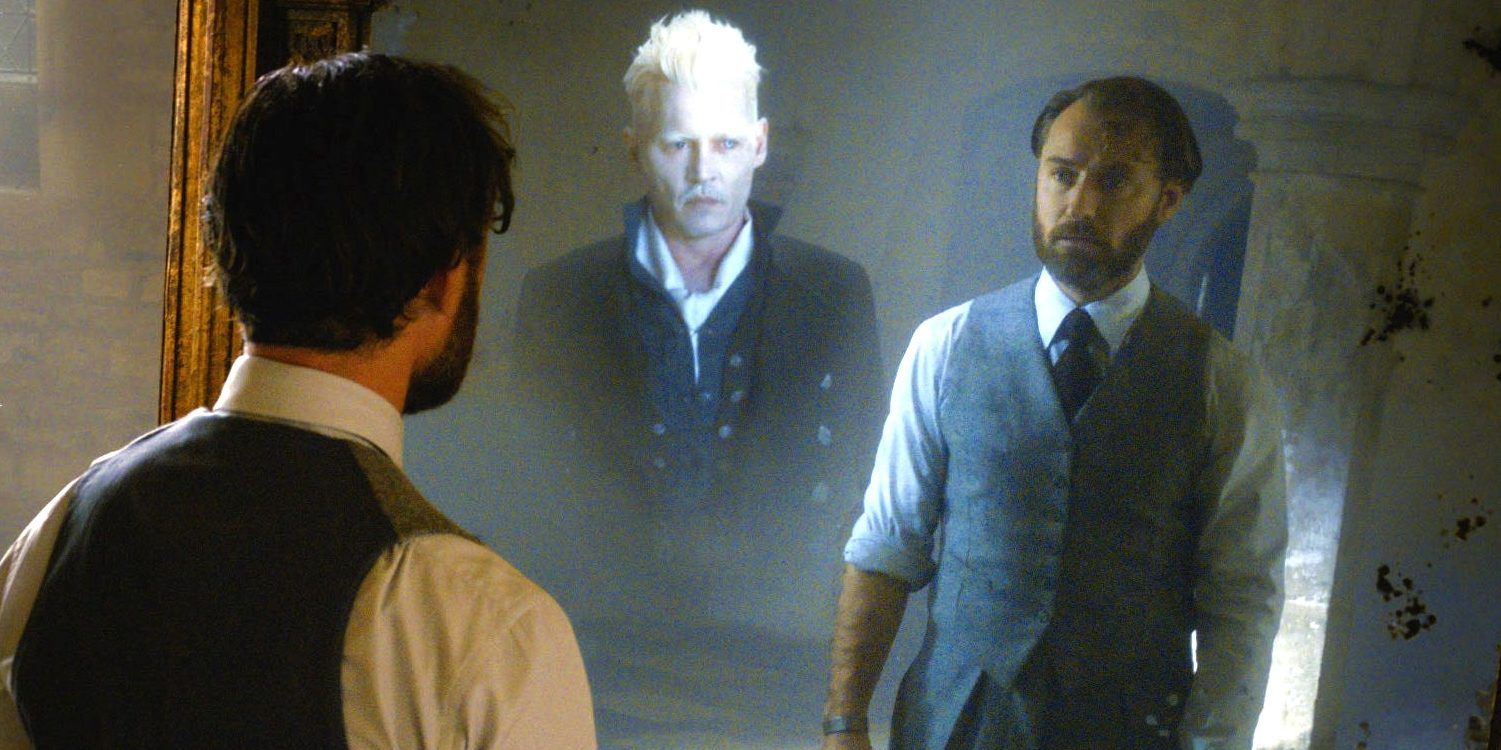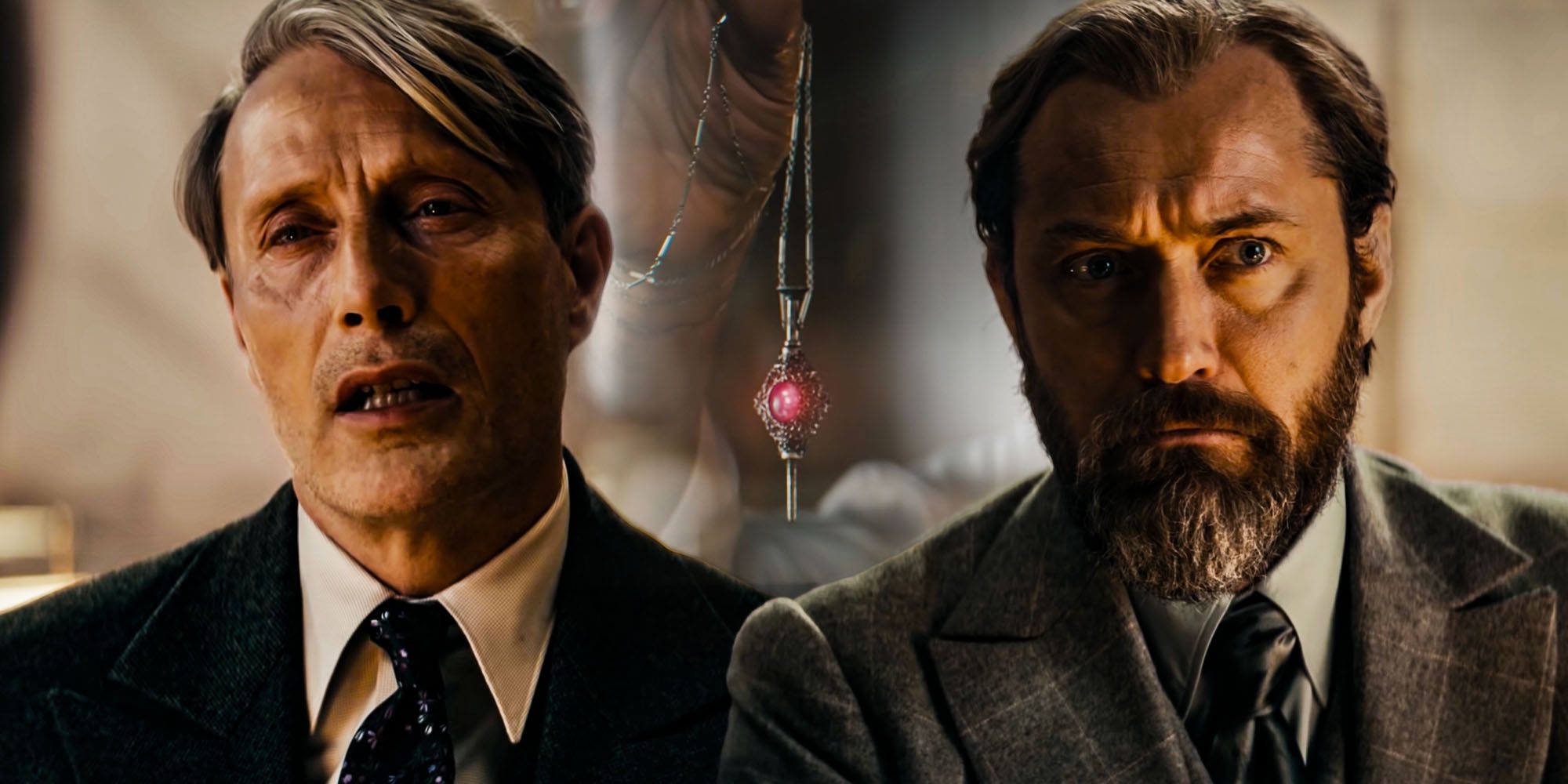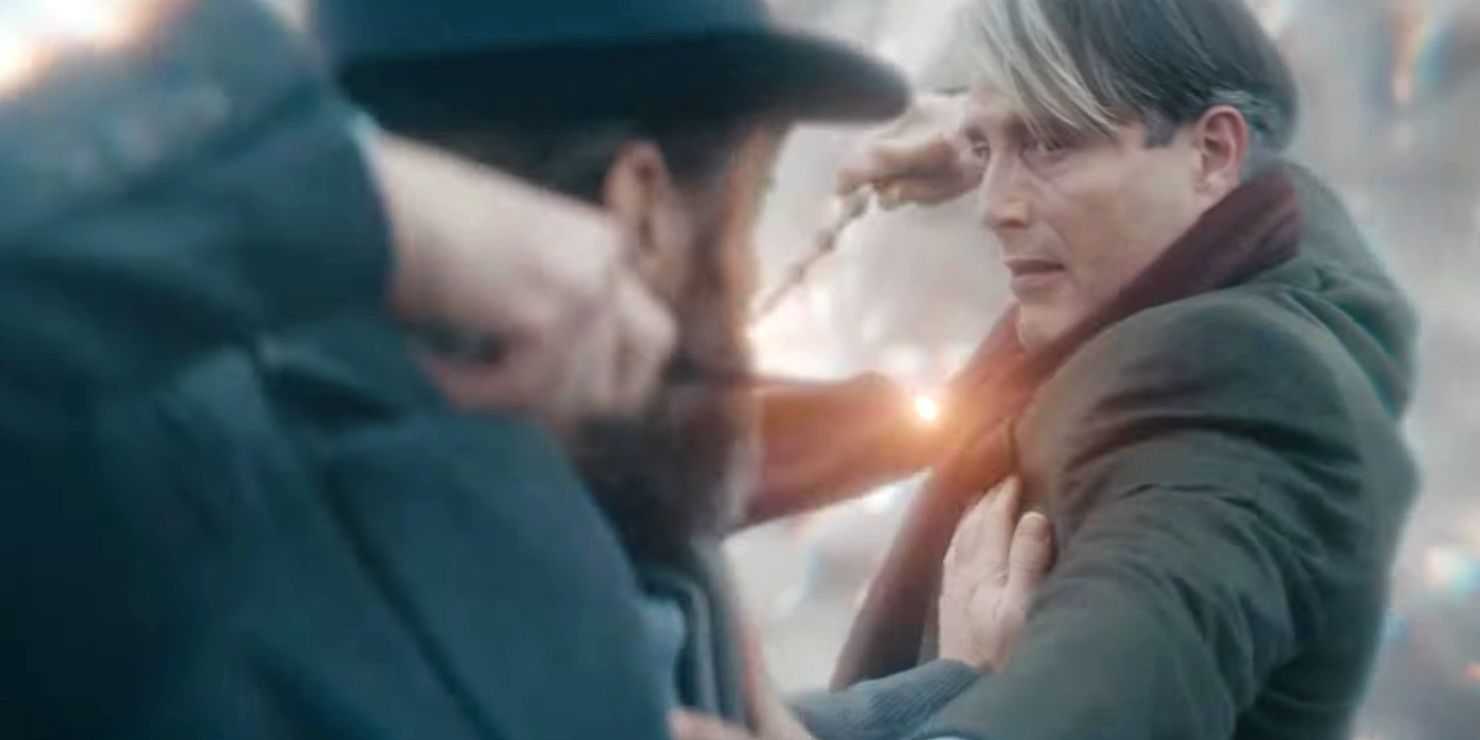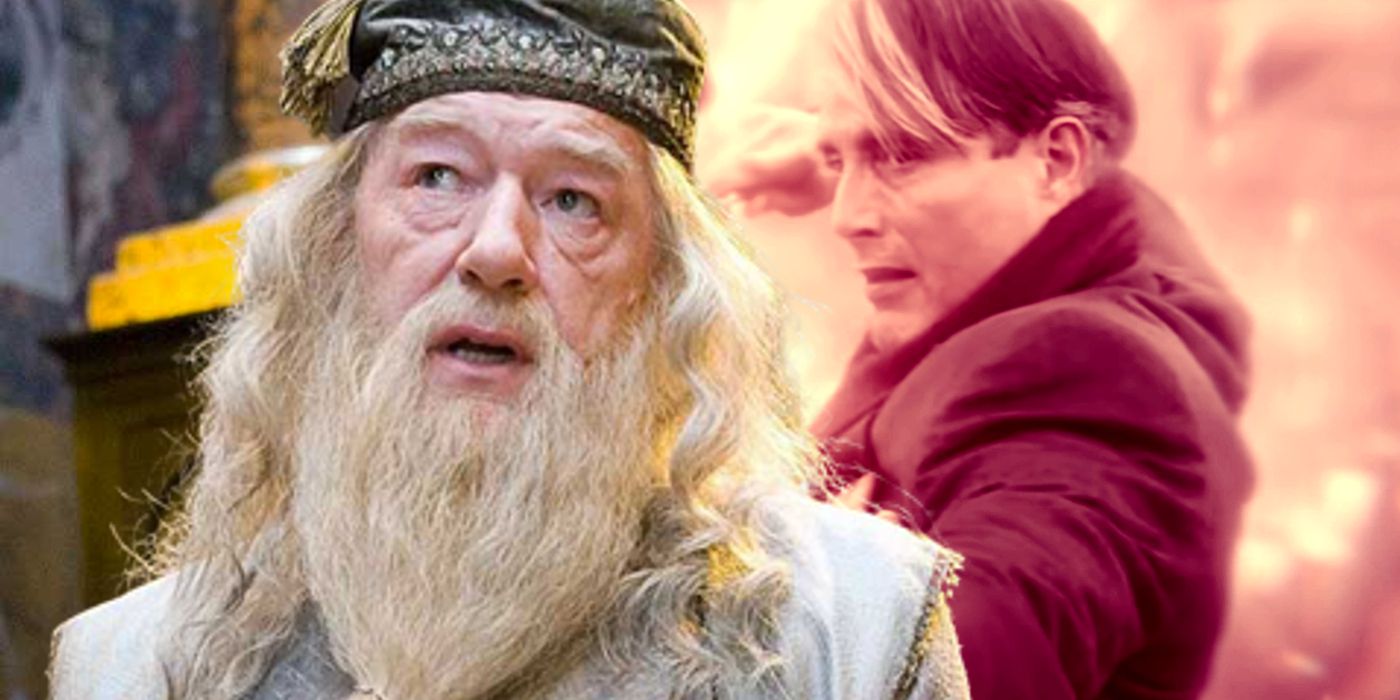WARNING! Contains SPOILERS for Fantastic Beasts: The Secrets of Dumbledore.
Fantastic Beasts: The Secrets of Dumbledore finally confirmed Albus Dumbledore's (Jude Law) sexuality, but it's unclear why exactly the Wizarding World took 15 years to show this on screen. Fantastic Beasts 3 saw Gellert Grindelwald (Mads Mikkelsen) rise to power and then fall once more as Dumbledore and his team curb his ascension to Supreme Mugwump of the International Confederation of Wizards. But most importantly, the movie explored Dumbledore and Grindelwald's backstory, and the (other) Dumbledore family secrets, including Credence/Aurelius (Ezra Miller) being Aberforth's (Richard Coyle) long-lost son.
Fantastic Beasts 3 opens with a scene that clarifies Dumbledore and Grindelwald's past and their current motivations. When Grindelwald reminds Dumbledore he once supported him in his pursuit of absolute power over Muggles, Dumbledore replies, "I was in love with you." He thus makes clear that what they had in 1899 was a romantic relationship - something previous films had just hinted at but never confirmed. Their open conversation also gives depth to Dumbledore's inner conflict about fighting Grindelwald and destroying their blood pact.
Harry Potter fans have known for a while that Albus Dumbledore was gay. At a 2007 Q&A session at the New York Carnegie Hall, J.K. Rowling said, "I always thought of Dumbledore as gay." However, none of the Harry Potter or Fantastic Beasts movies addressed Dumbledore's sexuality directly before Fantastic Beasts: The Secrets of Dumbledore. Making Dumbledore and Grindelwald's relationship explicit is truly transformative for Dumbledore's story arc and identity. Also, by doing so, Fantastic Beasts avoids the major blockbuster issue of weak and/or hidden LGBTQ+ relationships. However, from both practical and narrative perspectives, there are actually several reasons why it took so long for the Wizarding World movies to confirm Dumbledore was gay.
J.K. Rowling Only Confirmed Dumbledore Was Gay After Harry Potter Books Finished
Harry Potter and The Deathly Hallows was published by J.K. Rowling in the summer of 2007. The same year, she appeared at a Q&A session where she addressed fans' questions. When asked about Dumbledore's love life, Rowling stated Dumbledore was gay. She also commented on his relationship with Grindelwald (via The Guardian): "Dumbledore fell in love with Grindelwald, and that added to his horror when Grindelwald showed himself to be what he was. To an extent, do we say it excused Dumbledore a little more because falling in love can blind us to an extent, but he met someone as brilliant as he was and, rather like Bellatrix, he was very drawn to this brilliant person and horribly, terribly let down by him." But although she has always thought of Dumbledore as gay, Rowling never touched on his sexuality or his love life in the Harry Potter books.
Harry Potter Movies Never Touched On Dumbledore's Sexuality
Only four Harry Potter movies were released in and after 2007: The Order of The Phoenix, The Half-Blood Prince, and The Deathly Hallows, Parts 1 and 2. Of course, the first four movies couldn't have tackled Dumbledore's sexuality as Rowling hadn't yet revealed it to the public. But the last four movies chose to ignore it as well. Partially, this is because the Harry Potter films are, before anything else, adaptations of J.K. Rowling's books. If the books didn't explicitly go into Dumbledore's love life, neither did the movies - perhaps it would have been quite controversial to add these Dumbledore scenes to the movies. However, it wouldn't have taken a lot of effort, and given the fairly early timing of Rowling's reveal, it simply felt like something the Harry Potter movies weren't brave enough to tackle.
Fantastic Beasts 2 Made Dumbledore & Grindelwald's Relationship A Bigger Issue
Fantastic Beasts: The Crimes of Grindelwald was the first movie to touch on Dumbledore's relationship with Grindelwald. In this film, Newt Scamander (Eddie Redmayne) learns that Dumbledore and Grindelwald had made a blood pact when they met in 1899, swearing not to fight each other in the future. The blood pact prevented Dumbledore from facing Grindelwald in battle, so when Newt encounters Grindelwald in Paris, he uses his Niffler to steal his blood pact and hands it over to Dumbledore, hoping he might be able to destroy it. Fantastic Beasts 2 only developed Dumbledore and Grindelwald's relationship through the blood pact storyline, and through a short scene where Dumbledore looks into the Mirror of Erised and thinks about his lover-turned-foe. However, the movie steered clear of anything overtly saying Dumbledore had a gay relationship with Grindelwald.
Fantastic Beasts 3 Finally Confirms Dumbledore Is Gay (& Loved Grindelwald)
If the Fantastic Beasts franchise arguably has a good amount of issues (such as the irreparable Minerva McGonagall plot hole), Fantastic Beasts 3 does a great thing by finally confirming Dumbledore's sexuality. Albus tells Grindelwald "I was in love with you," and confirms this to Newt at the Hog's Head Inn, as he discusses the summer both he and his younger brother fell in love. At last, the Harry Potter universe creators aren't avoiding addressing a matter that has been a crucial part of Dumbledore's character and story arc. While this doesn't fix the franchise's mistakes, it properly addresses the characters' relationship and feelings, which is powerful and only fair (since so many other, albeit heterosexual relationships have been explored in the Harry Potter and Fantastic Beasts movies).
Why Fantastic Beasts 3 Showing Dumbeldore's Love For Grindelwald Is Important
Until The Secrets of Dumbledore, it hasn't been enough to say that Dumbledore was gay, or that he loved Grindelwald. There was no confirmation of these in the text, be it the Harry Potter books or the Fantastic Beasts scripts. Without canon confirmation, simply assuming Dumbledore was gay risked feeling like an after-the-fact adjustment. Dumbledore and Grindelwald's relationship had to be explicitly clear for representation as well as to avoid a major, recurrent blockbuster issue: the lack of and/or very weak LGBTQ+ relationships, introduced as if to pay lip service to the idea but never truly developed (and never concerning central characters). Confirming Dumbledore's sexuality is deeply transformative for his arc and his identity. Since Fantastic Beasts promised to explore Dumbledore's younger years, it did a good job of exploring this side of his character, too.
Fantastic Beasts 3 Still Creates A Problem With Dumbledore Being Gay
Perhaps unsurprisingly, revealing Dumbledore as gay also comes with an issue: it makes Dumbledore's story more tragic. After Albus and Aberforth counter Grindelwald's Avada Kedavra Curse, saving Credence and breaking the blood pact in the process, Grindelwald asks, "who's going to love you now, Dumbledore?" While Grindelwald is wrong - throughout his life, Dumbledore had a lot of people caring for him and supporting him - Dumbledore most likely never had another romantic relationship after Grindelwald. Of course, there's more to life than romantic relationships, and Dumbledore arguably sought happiness by stopping dark wizards, it's a sad story that the biggest gay character's romance ends with him loving one of the darkest wizards in history. Dumbledore never loving again is made even more tragic (and perhaps even troublesome) by comparison with so many characters who do find love in Fantastic Beasts, such as Queenie (Alison Sudol) and Jacob (Dan Fogler), and finally, Tina (Katherine Waterston) and Newt (who will eventually marry, according to Harry Potter canon).

